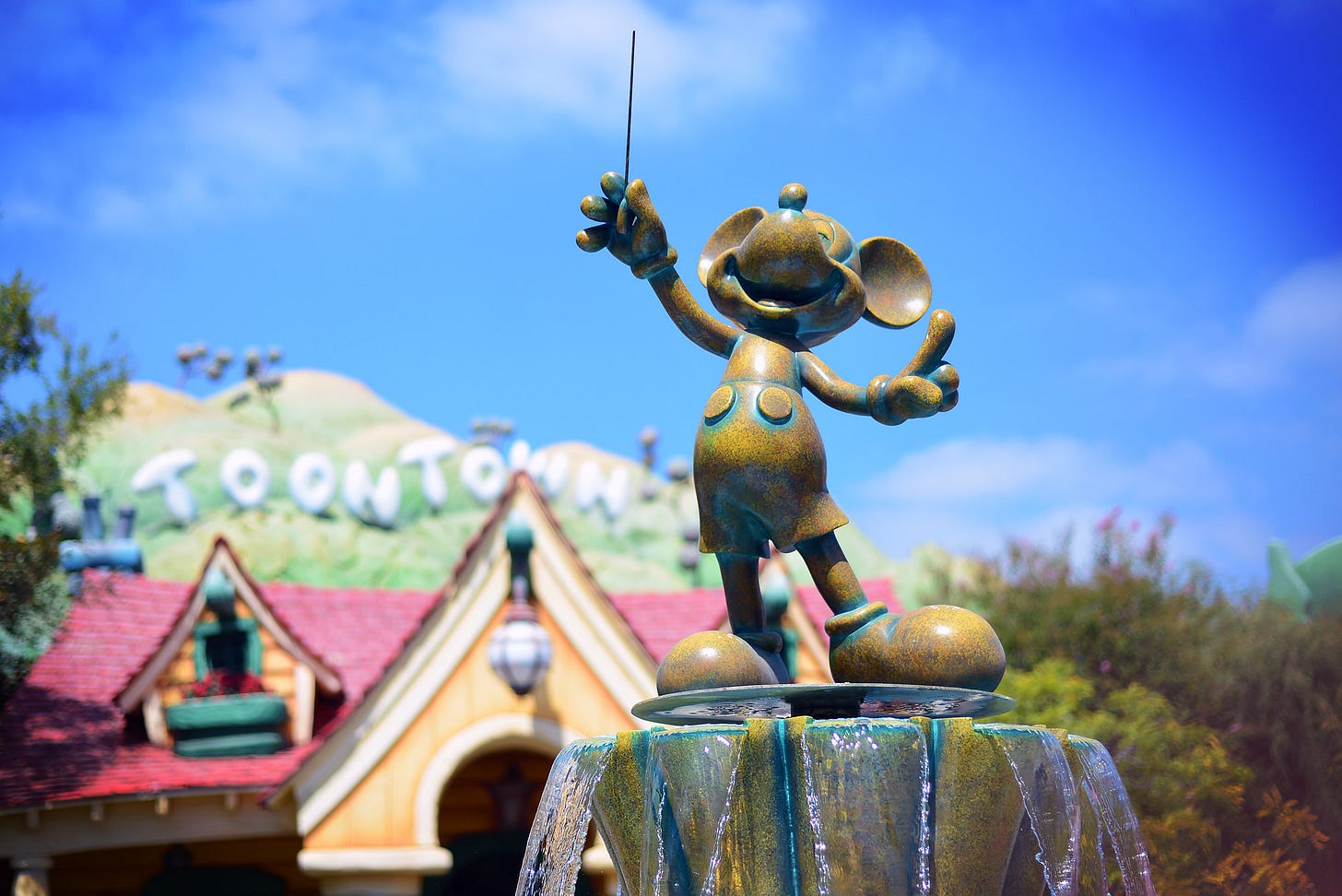
If you’re a new reader and you’d like future editions of Boondoggle delivered via email, just click the green button below. Thanks!
California’s Disneyland theme park is aiming to re-open next month from its coronavirus-imposed closure. And because Anaheim, where the park is located, has a $75 million budget deficit due to the pandemic shutting down lots of tourism-related activity, including Disneyland, some activists and lawmakers want to implement a new “gate tax” of $1 per ticket sold for the park.
“I think it’s important that in this moment to make sure that corporations like Disney, which have multibillion dollar profits, are able to pay into the communities that they are heavily subsidized in,” Anaheim community activist Joese Hernandez said. At least two city council members support the idea.
In total, Disney has received more than $1.2 billion in state and local subsidies in the U.S., with California leading the way by providing it almost half a billion dollars. A tiny tax — that won’t really be paid by the company, but by visitors — is quite literally the least it can do in this moment, especially when there are lots of people opposed to the park re-opening at all because the pandemic isn’t yet under control. A petition asking Disneyland to stay closed has garnered, as of this writing, more than 37,000 signatures.
Subsidies aside, Disney has had a fraught relationship with Anaheim for years. As I detailed in my book, in 2015, the city approved a several hundred million dollar handout to Disney to build a new luxury hotel. Anaheim’s mayor at the time opposed the giveaway, and said that nearly one-third of the city’s $300 million annual budget already went to supporting Disney and other resorts. He was outvoted.
In response, voters installed a more anti-Disney council in 2016, which Disney then spent millions of dollars ousting in 2018. But voters that latter year also approved a ballot initiative, known as Measure L, requiring companies that receive public subsidies to pay a $15 per hour minimum wage, rising to $18 by 2022 — which Disney canceled its planned hotel over, since it didn’t want to take any subsidies and thus be subjected to the ballot measure.
But the company is still in court over an older subsidy dating back to the mid-1990s. Under that deal, taxes collected from Disney hotels — as well as 20 percent of the tax collected at other hotels — go to pay off bonds that both expanded the Anaheim Convention Center and paid for infrastructure around Disney’s theme parks. Local activists and labor unions argue that deal should render Measure L applicable to Disney; Disney disagrees.
Crucially, Disney’s attempt to get away from anything that had a whiff of subsidies also led it to request the cancellation of a 45-year exemption it enjoyed on new ticket taxes in Anaheim, opening the door to today’s debate.
Despite all that, several council members and the mayor are opposed to the new tax (some on the grounds that it would also apply to other events like professional sports games that are likely to draw a more local crowd). To me, this seems like a simple matter of Anaheim feeling like it is still beholden to Disney when the opposite is true.
The company is not going to move Disneyland or let it wither on the vine. If a gate tax will help the budget situation, implement a gate tax. Hike other Disney taxes too. After all, Disney explicitly asked to ditch its tax exemption in order to avoid a minimum wage increase. There’s no need to continue to kow-tow to the Mouse, as it were. (And the company saved $1.2 billion annually from the Trump tax cuts, so it has cash to spare.)
When that bond deal from the 1990s expires, Anaheim should start pocketing all that money too — even though Disney will likely argue for the city to plow it into some new Disneyland-related investment. Disney is clearly willing to use its power to shape the town’s political landscape to its liking; the city’s politicians need to do the same.
A similar situation is currently playing out in Seattle, where activists and some lawmakers are pushing for a new tax on Amazon, that city’s most powerful company. Back in 2018, a tax on large Seattle companies was passed by the city council — and then repealed just a few weeks later, largely due to the influence of Amazon. Now a new Amazon tax is back on the table, due to the city’s coronavirus-related budget hole.
With Anaheim, though, the case is even better, since Amazon could conceivably leave Seattle with a whole lot more ease than Disney disinvesting from Disneyland. (Not that I think either is likely.) Post-pandemic, government services and government jobs are going to be cut dramatically, even under relatively rosy recovery scenarios. Every dollar raised elsewhere will help mitigate that effect.
One more thing: Interesting piece here by Sharon Fisher at Data Center Knowledge looking at the confluence of two boondoggles readers of this newsletter hopefully recognize: Data centers and Opportunity Zones. (Hat tip: Kasia Tarczynska)
Thanks for reading this edition of Boondoggle. If you liked it, please take a moment to click the little heart under the headline or below. And forward it around to friends, family, or neighbors using the green buttons. Every click and share really helps.
If you don’t subscribe already and you’d like to sign up, just click below.
Finally, if you’d like to pick up a copy of my book, The Billionaire Boondoggle, go here.
Thanks again!
— Pat Garofalo
